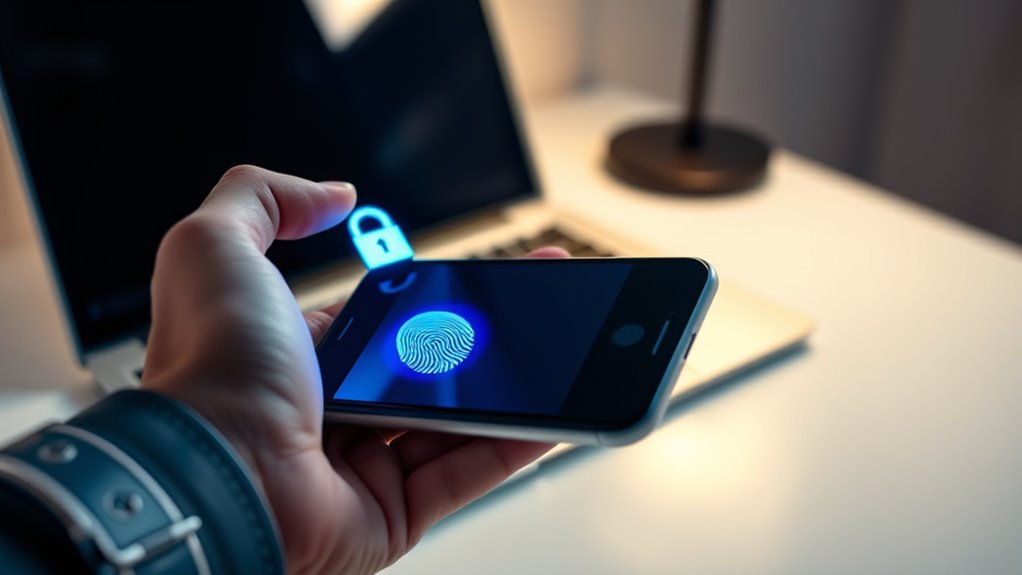Passwordless logins with passkeys let you securely access accounts using biometrics like fingerprints or facial recognition instead of traditional passwords. These systems use cryptographic keys stored on your device, making hacking much harder and reducing the risk of credential theft. They’re faster, more convenient, and more secure, offering a seamless experience across devices. To discover how this technology works and how it could change your online security, stick around for more details.
Key Takeaways
- Passkeys replace passwords with biometric authentication and cryptographic protocols for more secure login experiences.
- They store cryptographic keys locally on devices, preventing interception during transmission.
- Biometric data like fingerprints or facial features uniquely verify user identity, reducing impersonation risks.
- Standards such as FIDO2 and WebAuthn ensure passwordless logins are secure and compatible across platforms.
- Using passkeys simplifies authentication, enhances security, and eliminates the need to manage multiple passwords.

As cybersecurity threats grow more sophisticated, traditional passwords no longer offer sufficient protection. Hackers develop new techniques daily, making it easier for them to compromise accounts through phishing, brute-force attacks, or data breaches. That’s where passwordless logins with passkeys come into play. Instead of relying on complex, often forgettable passwords, passkeys use a combination of biometric authentication and advanced security protocols to authenticate your identity securely and seamlessly. This shift not only enhances security but also simplifies the login process, so you don’t have to remember or manage multiple passwords anymore.
Passwordless passkeys enhance security and simplify logins by replacing passwords with biometric authentication and secure cryptographic protocols.
When you switch to passwordless logins with passkeys, biometric authentication becomes a core component. This means your device recognizes your fingerprint, facial features, or even voice to verify who you are. Biometric data is unique to you, making it considerably harder for someone to impersonate you. Because this authentication method is tied directly to your device, it reduces the risk of stolen credentials being used elsewhere. Plus, biometric authentication works quickly, providing a smooth and convenient experience whenever you access your accounts, whether on a smartphone, tablet, or computer.
Security protocols underpin the entire passkey system. They ensure that your biometric data isn’t stored or transmitted insecurely. Instead, the system creates cryptographic keys that are stored locally on your device, never leaving it. When you attempt to log in, the passkey uses these cryptographic keys to verify your identity without transmitting sensitive information over the internet. This process makes it extremely difficult for hackers to intercept or forge your login credentials. The security protocols also leverage standards like FIDO2 and WebAuthn, which are designed specifically for passwordless authentication. These protocols ensure that your authentication process is both secure and interoperable across different platforms and services. Additionally, because biometric data is processed locally and not transmitted, it minimizes the risk of remote hacking attempts.
Frequently Asked Questions
Are Passkeys Compatible Across All Devices and Platforms?
Passkeys are designed for cross-platform compatibility, but full device synchronization depends on your ecosystem. Major platforms like Apple, Google, and Microsoft support passkeys, enabling you to use them across compatible devices. However, some older or less common devices may lack support, limiting seamless cross-platform use. To guarantee smooth device synchronization, keep your software updated and check compatibility features on each device.
What Security Measures Protect Passkeys From Theft or Hacking?
Passkeys are protected through end-to-end encryption, ensuring that your credentials stay secure during transmission. They also offer strong phishing resistance because they’re tied directly to your device and account, making it difficult for hackers to steal or misuse them. Additionally, passkeys use cryptographic methods that prevent unauthorized access, so even if someone tries to hack, they can’t easily intercept or replicate your passkeys, keeping your login information safe.
Can Users Recover Access if They Lose Their Device?
Ever wondered what happens if you lose your device? Don’t worry—you can recover access through device recovery options. Usually, you’ll use a backup method like a recovery key or a secondary device linked to your account. This way, even if you lose access to your original device, you can still securely regain control without risking your passkeys. It’s designed to keep your account safe while providing peace of mind.
How Do Passkeys Compare to Biometric Authentication?
You find that passkeys offer comparable security to biometric authentication but with different privacy implications. While biometric accuracy can vary, passkeys rely on cryptographic keys stored securely, reducing false positives or negatives. Unlike biometrics, passkeys don’t expose your unique traits, alleviating privacy concerns. This makes passkeys a convenient and safer option, especially if you’re wary of biometric data being compromised or misused.
Are Passkeys Legally Recognized as Valid Identification?
You’ll find that passkeys are increasingly recognized as valid authentication tools, but their legal recognition as official identification varies by jurisdiction. While they offer strong authentication validity for online access, they typically aren’t accepted as formal identification like a driver’s license or passport. You should check local laws and regulations to understand how passkeys are regarded legally, especially if you need official proof of identity.
Conclusion
Embracing passkeys transforms your login experience into a seamless, bulletproof fortress—more secure than any password could ever be. By switching to passwordless logins, you’re not just staying ahead of cyber threats; you’re revolutionizing how you access your digital world. Say goodbye to forgotten passwords and hello to effortless security that’s as elegant as it is invincible. Make the switch today and turn your online safety into a powerhouse that’s truly out of this world.









